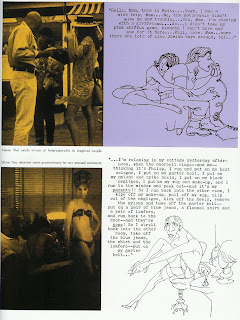“The Goodies – Almost Live”, 2 November 1976
Starts at 6.10
“The Midnight Cow Person” – Tim Brooke-Taylor
Another gay cowboy joke. “Midnight Cowperson” with its pre-Politcally Correct phrasing is a reference to the film “Midnight Cowboy”, in which Jon Voight played a hustler who make occasional forays into homosexuality.
This was originally performed on the 11 November 1973 episode of “I’m Sorry I’ll Read That Again”. It was sung by its writer Bill Oddie (the short bearded one). That version has shtick missing from this, where cowboy yodelling becomes a chorus of camp “Ooooohs!”
The song is torn between two different sets of gay clichés and just silly jokes about sitting on a prickly pear and animal gags. The pear/ bottom gags, one could possibly see as deferring any real gags about sodomy or sexual interest. Its all about a comic painful incident rather than any real suggestion of S&M. The frilly pink comical cowboy outfit is slightly at odds with all the fetish gear mentioned in this song, but that’s just one of those confusions which comedy writers in the 70s have difficulty coming to grips with. Predatory or pouffy?
-----------------
My name is Two Gun Pierre
I wear rose buds in my hair
And a chi-chi pink bandanna round my neck
I came down from Tennessee
With a cowboy on my knee
And a pair of leather chaps around my legs ... hold on boys!
I was down in Cripple Creek
I was dying for a leak
So I dropped my pants behind a cactus there
When I fastened up my belt
I can't tell ya how I felt
But I knew the meaning of a prickly pear ... ouch!!
Oh I've got a cactus in my y-fronts and a vulture round my head
I've just been kissed by a Tennessee miss and I wish that I were dead
I've a jockstrap made of leather and pants of PVC (ee - ee - ee - ee - ee - ee)
The cactus in my y-fronts make a loser out of me!
In Californ - i - a
Where the rustlers are so gay
I bought a gentle gee-gee name of Jacques
But he livened up a lot
When he felt my prickly spot
And that buckin' bronco broke my buckin' back!
So I walked up to Nevada
Where the gals try so much harder
And I met a beefy belle called Caroline
But when she felt my prickles
She cried "Oh Lord, that tickles!"
And now she's run off with a porcupine
Oh I've got a cactus in my y-fronts and a vulture round my head
I've just been kissed by a Tennessee miss and I wish that I were dead
Do you like my high heeled horseshoes, I got them from Paree (ee - ee - ee - ee - ee - ee)
The cactus in my y-fronts make a loser out of me!
Oh I've got a cactus in my y-fronts and a vulture round my head
I've just been kissed by a Tennessee miss and I wish that I were dead
I've got sequins on my saddle and I smell like a jasmine tree (ee - ee - ee - ee - ee - ee)
The cactus in my y-fronts make a loser out of me!
Well I'll be hornswaggled! What are you gonna be?!
 in “Private Eye” 30 June 1972
in “Private Eye” 30 June 1972


















